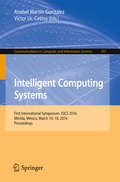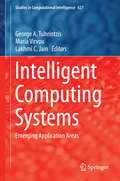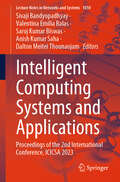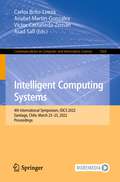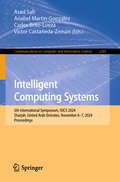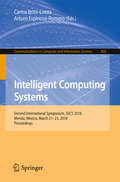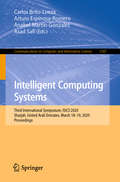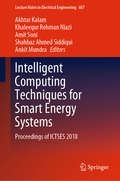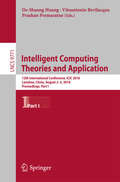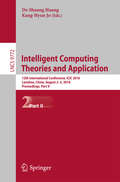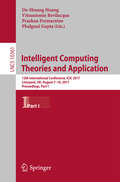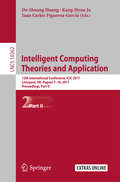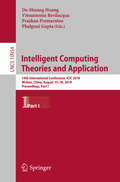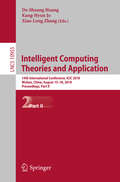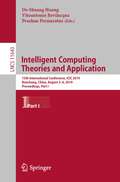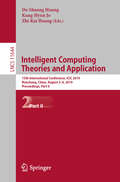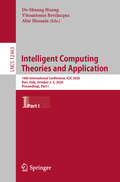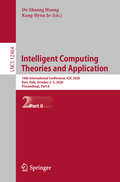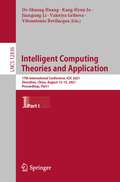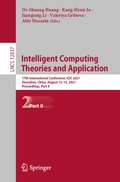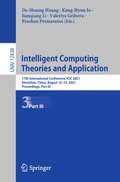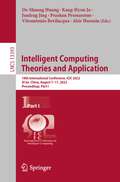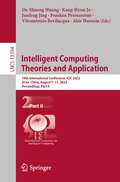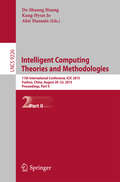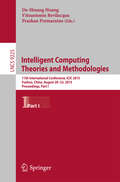- Table View
- List View
Intelligent Computing Systems
by Anabel Martin-Gonzalez Victor Uc-CetinaThis book contains the reviewed, accepted contributions ofthe First International Symposium on Intelligent Computing Systems (ISICS) that was held in Merida (Mexico) from 16-18 March 2016. We received 25 submissions from 13 countries. Eachsubmission had been evaluated by at least three members of the ProgramCommittee and external reviewers. Based on these reviews, 12 papers wereselected for long oral presentation. In addition to the contributed papers,four keynote speaker presentations were included in the conference program.
Intelligent Computing Systems
by Lakhmi C. Jain Maria Virvou George A. TsihrintzisThis book at hand explores emerging scientific and technological areas in which Intelligent Computing Systems provide efficient solutions and,thus, may play a role in the years to come. It demonstrates how Intelligent Computing Systems make use of computational methodologies that mimic nature-inspired processes to address real world problems of high complexity for which exact mathematical solutions, based on physical and statistical modelling, are intractable. Common intelligent computational methodologies are presented including artificial neural networks, evolutionary computation,genetic algorithms, artificial immune systems, fuzzy logic, swarm intelligence, artificial life, virtual worlds and hybrid methodologies based on combinations of the previous. The book will be useful to researchers, practitioners and graduate students dealing with mathematically-intractable problems. It is intended for both the expert/researcher in the field of Intelligent Computing Systems, as well as for the general reader in the fields of Artificial and Computational Intelligence who wishes to learn more about the field of Intelligent Computing Systems and its applications. An extensive list of bibliographic references at the end of each chapter guides the reader to probe further into application area of interest to him/her.
Intelligent Computing Systems and Applications: Proceedings of the 2nd International Conference, ICICSA 2023 (Lecture Notes in Networks and Systems #1010)
by Valentina Emilia Balas Sivaji Bandyopadhyay Dalton Meitei Thounaojam Saroj Kumar Biswas Anish Kumar SahaThe book includes peer-reviewed papers presented at the 2nd International Conference on Intelligent Computing Systems and Applications (ICICSA 2023). The book discusses the most recent advances in artificial intelligence, machine learning, data science, natural language processing, computer vision, image processing, embedded systems, robotics, IoT, computer networking and communications, optimization, security, and cryptography, among other topics. It also discusses several application areas and modeling methodologies in many fields. This book will be useful for researchers and academics working in relevant fields.
Intelligent Computing Systems: 4th International Symposium, ISICS 2022, Santiago, Chile, March 23–25, 2022, Proceedings (Communications in Computer and Information Science #1569)
by Anabel Martin-Gonzalez Carlos Brito-Loeza Asad Safi Victor Castañeda-ZemanThis book constitutes the proceedings of the 4th International Symposium on Intelligent Computing Systems, ISICS 2022, held in Santiago, Chile, in March 2022. Due to the COVID-19 pandemic the conference was held online. The 9 full papers along with 2 short papers presented in this volume were carefully reviewed and selected from 30 submissions. They deal with the field of intelligent computing systems focusing on artificial intelligence, computer vision and image processing.
Intelligent Computing Systems: 5th International Symposium, ISICS 2024, Sharjah, United Arab Emirates, November 6–7, 2024, Proceedings (Communications in Computer and Information Science #2381)
by Anabel Martin-Gonzalez Carlos Brito-Loeza Asad Safi Victor Castañeda-ZemanThis book constitutes the proceedings of the 5th International Symposium on Intelligent Computing Systems, ISICS 2024, held in Sharjah, United Arab Emirates, during November 6-7, 2024. The 25 full papers included in this book were carefully reviewed and selected from 71 submissions. They focus on research and practice in the fields of artificial intelligence, computer vision, and image processing.
Intelligent Computing Systems: Second International Symposium, Isics 2018, Merida, Mexico, March 21-23, 2018, Proceedings (Communications In Computer And Information Science #820)
by Carlos Brito-Loeza Arturo Espinosa-RomeroThis book constitutes the proceedings of the Second International Symposium on Intelligent Computing Systems, ISICS 2018, held in Merida, Mexico, in March 2018. The 12 papers presented in this volume were carefully reviewed and selected from 28 submissions. They deal with the field of intelligent computing systems focusing on artificial intelligence, computer vision and image processing.
Intelligent Computing Systems: Third International Symposium, ISICS 2020, Sharjah, United Arab Emirates, March 18–19, 2020, Proceedings (Communications in Computer and Information Science #1187)
by Anabel Martin-Gonzalez Carlos Brito-Loeza Arturo Espinosa-Romero Asad SafiThis book constitutes the proceedings of the Third International Symposium on Intelligent Computing Systems, ISICS 2020, held in Sharjah, United Arab Emirates, in March 2020. The 13 full papers presented in this volume were carefully reviewed and selected from 46 submissions. They deal with the field of intelligent computing systems focusing on artificial intelligence, computer vision and image processing.
Intelligent Computing Techniques for Smart Energy Systems: Proceedings of ICTSES 2018 (Lecture Notes in Electrical Engineering #607)
by Akhtar Kalam Ankit Mundra Khaleequr Rehman Niazi Amit Soni Shahbaz Ahmed SiddiquiThe book compiles the research works related to smart solutions concept in context to smart energy systems, maintaining electrical grid discipline and resiliency, computational collective intelligence consisted of interaction between smart devices, smart environments and smart interactions, as well as information technology support for such areas. It includes high-quality papers presented in the International Conference on Intelligent Computing Techniques for Smart Energy Systems organized by Manipal University Jaipur. This book will motivate scholars to work in these areas. The book also prophesies their approach to be used for the business and the humanitarian technology development as research proposal to various government organizations for funding approval.
Intelligent Computing Theories and Application
by Prashan Premaratne De-Shuang Huang Vitoantonio BevilacquaThis volume, in conjunction with the two volumes LNCS 4681 and LNAI 4682, constitutes the refereed proceedings of the Third International Conference on Intelligent Computing held in Qingdao, China, in August 2007. The conference sought to establish contemporary intelligent computing techniques as an integral method that underscores trends in advanced computational intelligence and links theoretical research with applications.
Intelligent Computing Theories and Application
by De-Shuang Huang Kang-Hyun JoThis volume, in conjunction with the two volumes LNCS 4681 and LNAI 4682, constitutes the refereed proceedings of the Third International Conference on Intelligent Computing held in Qingdao, China, in August 2007. The conference sought to establish contemporary intelligent computing techniques as an integral method that underscores trends in advanced computational intelligence and links theoretical research with applications.
Intelligent Computing Theories and Application
by Phalguni Gupta Prashan Premaratne De-Shuang Huang Vitoantonio BevilacquaThe International Conference on Intelligent Computing (ICIC) was formed to provide an annual forum dedicated to the emerging and challenging topics in artificial intel- gence, machine learning, pattern recognition, image processing, bioinformatics, and computational biology. It aims to bring together researchers and practitioners from both academia and industry to share ideas, problems, and solutions related to the m- tifaceted aspects of intelligent computing. ICIC 2010, held in Changsha, China, August 18-21, 2010, constituted the 6th - ternational Conference on Intelligent Computing. It built upon the success of ICIC 2009, ICIC 2008, ICIC 2007, ICIC 2006, and ICIC 2005, that were held in Ulsan, Korea, Shanghai, Qingdao, Kunming and Hefei, China, respectively. This year, the conference concentrated mainly on the theories and methodologies as well as the emerging applications of intelligent computing. Its aim was to unify the picture of contemporary intelligent computing techniques as an integral concept that highlights the trends in advanced computational intelligence and bridges theoretical research with applications. Therefore, the theme for this conference was "Advanced Intelligent Computing Technology and Applications. " Papers focusing on this theme were solicited, addressing theories, methodologies, and applications in science and technology.
Intelligent Computing Theories and Application
by De-Shuang Huang Kang-Hyun Jo Juan Carlos Figueroa-GarcíaThe International Conference on Intelligent Computing (ICIC) was formed to provide an annual forum dedicated to the emerging and challenging topics in artificial intel- gence, machine learning, pattern recognition, image processing, bioinformatics, and computational biology. It aims to bring together researchers and practitioners from both academia and industry to share ideas, problems, and solutions related to the m- tifaceted aspects of intelligent computing. ICIC 2010, held in Changsha, China, August 18-21, 2010, constituted the 6th - ternational Conference on Intelligent Computing. It built upon the success of ICIC 2009, ICIC 2008, ICIC 2007, ICIC 2006, and ICIC 2005, that were held in Ulsan, Korea, Shanghai, Qingdao, Kunming and Hefei, China, respectively. This year, the conference concentrated mainly on the theories and methodologies as well as the emerging applications of intelligent computing. Its aim was to unify the picture of contemporary intelligent computing techniques as an integral concept that highlights the trends in advanced computational intelligence and bridges theoretical research with applications. Therefore, the theme for this conference was "Advanced Intelligent Computing Technology and Applications. " Papers focusing on this theme were solicited, addressing theories, methodologies, and applications in science and technology.
Intelligent Computing Theories and Application: 14th International Conference, ICIC 2018, Wuhan, China, August 15-18, 2018, Proceedings, Part I (Lecture Notes in Computer Science #10954)
by Phalguni Gupta Prashan Premaratne De-Shuang Huang Vitoantonio BevilacquaThis two-volume set LNCS 10954 and LNCS 10955 constitutes - in conjunction with the volume LNAI 10956 - the refereed proceedings of the 14th International Conference on Intelligent Computing, ICIC 2018, held in Wuhan, China, in August 2018. The 275 full papers and 72 short papers of the three proceedings volumes were carefully reviewed and selected from 632 submissions. The papers are organized in topical sections such as Neural Networks.- Pattern Recognition.- Image Processing.- Intelligent Computing in Robotics.- Intelligent Control and Automation.- Intelligent Data Analysis and Prediction.- Fuzzy Theory and Algorithms.- Supervised Learning.- Unsupervised Learning.- Kernel Methods and Supporting Vector Machines.- Knowledge Discovery and Data Mining.- Natural Language Processing and Computational Linguistics.- Gene Expression Array Analysis.- Systems Biology.- Computational Genomics.- Computational Proteomics.- Gene Regulation Modeling and Analysis.- Protein-Protein Interaction Prediction.- Next-Gen Sequencing and Metagenomics.- Structure Prediction and Folding.- Evolutionary Optimization for Scheduling.- High-Throughput Biomedical Data Integration and Mining.- Machine Learning Algorithms and Applications.- Heuristic Optimization Algorithms for Real-World Applications.- Evolutionary Multi-Objective Optimization and Its Applications.- Swarm Evolutionary Algorithms for Scheduling and Combinatorial.- Optimization.- Swarm Intelligence and Applications in Combinatorial Optimization.- Advances in Metaheuristic Optimization Algorithm.- Advances in Image Processing and Pattern Recognition Techniques.- AI in Biomedicine.- Bioinformatics.- Biometrics Recognition.- Information Security.- Virtual Reality and Human-Computer Interaction.- Healthcare Informatics Theory and Methods.- Intelligent Computing in Computer Vision.- Intelligent Agent and Web Applications.- Reinforcement Learning.- Machine Learning.- Modeling, Simulation, and Optimization of Biological Systems.- Biomedical Data Modeling and Mining.- Cheminformatics.- Intelligent Computing in Computational Biology.- Protein Structure and Function Prediction.- Biomarker Discovery.- Hybrid Computational Intelligence: Theory and Application in Bioinformatics, Computational Biology and Systems Biology.- IoT and Smart Data.- Intelligent Systems and Applications for Bioengineering.- Evolutionary Optimization: Foundations and Its Applications to Intelligent Data Analytics.- Protein and Gene Bioinformatics: Analysis, Algorithms and Applications.
Intelligent Computing Theories and Application: 14th International Conference, ICIC 2018, Wuhan, China, August 15-18, 2018, Proceedings, Part II (Lecture Notes in Computer Science #10955)
by De-Shuang Huang Kang-Hyun Jo Xiao-Long ZhangThis two-volume set LNCS 10954 and LNCS 10955 constitutes - in conjunction with the volume LNAI 10956 - the refereed proceedings of the 14th International Conference on Intelligent Computing, ICIC 2018, held in Wuhan, China, in August 2018. The 275 full papers and 72 short papers of the three proceedings volumes were carefully reviewed and selected from 632 submissions. The papers are organized in topical sections such as Neural Networks.- Pattern Recognition.- Image Processing.- Intelligent Computing in Robotics.- Intelligent Control and Automation.- Intelligent Data Analysis and Prediction.- Fuzzy Theory and Algorithms.- Supervised Learning.- Unsupervised Learning.- Kernel Methods and Supporting Vector Machines.- Knowledge Discovery and Data Mining.- Natural Language Processing and Computational Linguistics.- Gene Expression Array Analysis.- Systems Biology.- Computational Genomics.- Computational Proteomics.- Gene Regulation Modeling and Analysis.- Protein-Protein Interaction Prediction.- Next-Gen Sequencing and Metagenomics.- Structure Prediction and Folding.- Evolutionary Optimization for Scheduling.- High-Throughput Biomedical Data Integration and Mining.- Machine Learning Algorithms and Applications.- Heuristic Optimization Algorithms for Real-World Applications.- Evolutionary Multi-Objective Optimization and Its Applications.- Swarm Evolutionary Algorithms for Scheduling and Combinatorial.- Optimization.- Swarm Intelligence and Applications in Combinatorial Optimization.- Advances in Metaheuristic Optimization Algorithm.- Advances in Image Processing and Pattern Recognition Techniques.- AI in Biomedicine.- Bioinformatics.- Biometrics Recognition.- Information Security.- Virtual Reality and Human-Computer Interaction.- Healthcare Informatics Theory and Methods.- Intelligent Computing in Computer Vision.- Intelligent Agent and Web Applications.- Reinforcement Learning.- Machine Learning.- Modeling, Simulation, and Optimization of Biological Systems.- Biomedical Data Modeling and Mining.- Cheminformatics.- Intelligent Computing in Computational Biology.- Protein Structure and Function Prediction.- Biomarker Discovery.- Hybrid Computational Intelligence: Theory and Application in Bioinformatics, Computational Biology and Systems Biology.- IoT and Smart Data.- Intelligent Systems and Applications for Bioengineering.- Evolutionary Optimization: Foundations and Its Applications to Intelligent Data Analytics.- Protein and Gene Bioinformatics: Analysis, Algorithms and Applications.
Intelligent Computing Theories and Application: 15th International Conference, ICIC 2019, Nanchang, China, August 3–6, 2019, Proceedings, Part I (Lecture Notes in Computer Science #11643)
by Prashan Premaratne De-Shuang Huang Vitoantonio BevilacquaThis two-volume set of LNCS 11643 and LNCS 11644 constitutes - in conjunction with the volume LNAI 11645 - the refereed proceedings of the 15th International Conference on Intelligent Computing, ICIC 2019, held in Nanchang, China, in August 2019. The 217 full papers of the three proceedings volumes were carefully reviewed and selected from 609 submissions. The ICIC theme unifies the picture of contemporary intelligent computing techniques as an integral concept that highlights the trends in advanced computational intelligence and bridges theoretical research with applications. The theme for this conference is “Advanced Intelligent Computing Methodologies and Applications.” Papers related to this theme are especially solicited, including theories, methodologies, and applications in science and technology.
Intelligent Computing Theories and Application: 15th International Conference, ICIC 2019, Nanchang, China, August 3–6, 2019, Proceedings, Part II (Lecture Notes in Computer Science #11644)
by De-Shuang Huang Kang-Hyun Jo Zhi-Kai HuangThis two-volume set of LNCS 11643 and LNCS 11644 constitutes - in conjunction with the volume LNAI 11645 - the refereed proceedings of the 15th International Conference on Intelligent Computing, ICIC 2019, held in Nanchang, China, in August 2019. The 217 full papers of the three proceedings volumes were carefully reviewed and selected from 609 submissions.The ICIC theme unifies the picture of contemporary intelligent computing techniques as an integral concept that highlights the trends in advanced computational intelligence and bridges theoretical research with applications. The theme for this conference is “Advanced Intelligent Computing Methodologies and Applications.” Papers related to this theme are especially solicited, including theories, methodologies, and applications in science and technology.
Intelligent Computing Theories and Application: 16th International Conference, ICIC 2020, Bari, Italy, October 2–5, 2020, Proceedings, Part I (Lecture Notes in Computer Science #12463)
by De-Shuang Huang Abir Hussain Vitoantonio BevilacquaThis two-volume set of LNCS 12463 and LNCS 12464 constitutes - in conjunction with the volume LNAI 12465 - the refereed proceedings of the 16th International Conference on Intelligent Computing, ICIC 2020, held in Bari, Italy, in October 2020. The 162 full papers of the three proceedings volumes were carefully reviewed and selected from 457 submissions. The ICIC theme unifies the picture of contemporary intelligent computing techniques as an integral concept that highlights the trends in advanced computational intelligence and bridges theoretical research with applications. The theme for this conference is “Advanced Intelligent Computing Methodologies and Applications.” Papers related to this theme are especially solicited, addressing theories, methodologies, and applications in science and technology.
Intelligent Computing Theories and Application: 16th International Conference, ICIC 2020, Bari, Italy, October 2–5, 2020, Proceedings, Part II (Lecture Notes in Computer Science #12464)
by De-Shuang Huang Kang-Hyun JoThis two-volume set of LNCS 12463 and LNCS 12464 constitutes - in conjunction with the volume LNAI 12465 - the refereed proceedings of the 16th International Conference on Intelligent Computing, ICIC 2020, held in Bari, Italy, in October 2020. The 162 full papers of the three proceedings volumes were carefully reviewed and selected from 457 submissions. The ICIC theme unifies the picture of contemporary intelligent computing techniques as an integral concept that highlights the trends in advanced computational intelligence and bridges theoretical research with applications. The theme for this conference is “Advanced Intelligent Computing Methodologies and Applications.” Papers related to this theme are especially solicited, addressing theories, methodologies, and applications in science and technology.
Intelligent Computing Theories and Application: 17th International Conference, ICIC 2021, Shenzhen, China, August 12–15, 2021, Proceedings, Part I (Lecture Notes in Computer Science #12836)
by De-Shuang Huang Kang-Hyun Jo Vitoantonio Bevilacqua Jianqiang Li Valeriya GribovaThis two-volume set of LNCS 12836 and LNCS 12837 constitutes - in conjunction with the volume LNAI 12838 - the refereed proceedings of the 17th International Conference on Intelligent Computing, ICIC 2021, held in Shenzhen, China in August 2021. The 192 full papers of the three proceedings volumes were carefully reviewed and selected from 458 submissions. The ICIC theme unifies the picture of contemporary intelligent computing techniques as an integral concept that highlights the trends in advanced computational intelligence and bridges theoretical research with applications. The theme for this conference is “Advanced Intelligent Computing Methodologies and Applications.” The papers are organized in the following subsections: Evolutionary Computation and Learning, Image and signal Processing, Information Security, Neural Networks, Pattern Recognition Swarm Intelligence and Optimization, and Virtual Reality and Human-Computer Interaction.
Intelligent Computing Theories and Application: 17th International Conference, ICIC 2021, Shenzhen, China, August 12–15, 2021, Proceedings, Part II (Lecture Notes in Computer Science #12837)
by De-Shuang Huang Kang-Hyun Jo Abir Hussain Jianqiang Li Valeriya GribovaThis two-volume set of LNCS 12836 and LNCS 12837 constitutes - in conjunction with the volume LNAI 12838 - the refereed proceedings of the 17th International Conference on Intelligent Computing, ICIC 2021, held in Shenzhen, China in August 2021. The 192 full papers of the three proceedings volumes were carefully reviewed and selected from 458 submissions. The ICIC theme unifies the picture of contemporary intelligent computing techniques as an integral concept that highlights the trends in advanced computational intelligence and bridges theoretical research with applications. The theme for this conference is “Advanced Intelligent Computing Methodologies and Applications.” The papers are organized in the following subsections: Intelligent Computing in Computer Vision, Intelligent Control and Automation, Intelligent Modeling Technologies for Smart Cities, Machine Learning, and Theoretical Computational Intelligence and Applications.
Intelligent Computing Theories and Application: 17th International Conference, ICIC 2021, Shenzhen, China, August 12–15, 2021, Proceedings, Part III (Lecture Notes in Computer Science #12838)
by Prashan Premaratne De-Shuang Huang Kang-Hyun Jo Jianqiang Li Valeriya GribovaThis two-volume set of LNCS 12836 and LNCS 12837 constitutes - in conjunction with the volume LNAI 12838 - the refereed proceedings of the 17th International Conference on Intelligent Computing, ICIC 2021, held in Shenzhen, China in August 2021. The 192 full papers of the three proceedings volumes were carefully reviewed and selected from 458 submissions. The ICIC theme unifies the picture of contemporary intelligent computing techniques as an integral concept that highlights the trends in advanced computational intelligence and bridges theoretical research with applications. The theme for this conference is “Advanced Intelligent Computing Methodologies and Applications.”The papers are organized in the following subsections: Artificial Intelligence in Real World Applications, Biomedical Informatics Theory and Methods, Complex Diseases Informatics, Gene Regulation Modeling and Analysis, Intelligent Computing in Computational Biology, and Protein Structure and Function Prediction.
Intelligent Computing Theories and Application: 18th International Conference, ICIC 2022, Xi'an, China, August 7–11, 2022, Proceedings, Part I (Lecture Notes in Computer Science #13393)
by Prashan Premaratne De-Shuang Huang Kang-Hyun Jo Abir Hussain Vitoantonio Bevilacqua Junfeng JingThis two-volume set of LNCS 13393 and LNCS 13394 constitutes - in conjunction with the volume LNAI 13395 - the refereed proceedings of the 18th International Conference on Intelligent Computing, ICIC 2022, held in Xi'an, China, in August 2022. The 209 full papers of the three proceedings volumes were carefully reviewed and selected from 449 submissions.This year, the conference concentrated mainly on the theories and methodologies as well as the emerging applications of intelligent computing. Its aim was to unify the picture of contemporary intelligent computing techniques as an integral concept that highlights the trends in advanced computational intelligence and bridges theoretical research with applications. Therefore, the theme for this conference was “Advanced Intelligent Computing Technology and Applications”. Papers focused on this theme were solicited, addressing theories, methodologies, and applications in science and technology.
Intelligent Computing Theories and Application: 18th International Conference, ICIC 2022, Xi'an, China, August 7–11, 2022, Proceedings, Part II (Lecture Notes in Computer Science #13394)
by Prashan Premaratne De-Shuang Huang Kang-Hyun Jo Abir Hussain Vitoantonio Bevilacqua Junfeng JingThis two-volume set of LNCS 13393 and LNCS 13394 constitutes - in conjunction with the volume LNAI 13395 - the refereed proceedings of the 18th International Conference on Intelligent Computing, ICIC 2022, held in Xi'an, China, in August 2022. The 209 full papers of the three proceedings volumes were carefully reviewed and selected from 449 submissions.This year, the conference concentrated mainly on the theories and methodologies as well as the emerging applications of intelligent computing. Its aim was to unify the picture of contemporary intelligent computing techniques as an integral concept that highlights the trends in advanced computational intelligence and bridges theoretical research with applications. Therefore, the theme for this conference was “Advanced Intelligent Computing Technology and Applications”. Papers focused on this theme were solicited, addressing theories, methodologies, and applications in science and technology.
Intelligent Computing Theories and Methodologies
by De-Shuang Huang Kang-Hyun Jo Abir HussainThis two-volume set LNCS 9225 and LNCS 9226 constitutes - in conjunction with the volume LNAI 9227 - the refereed proceedings of the 11th International Conference on Intelligent Computing, ICIC 2015, held in Fuzhou, China, in August 2015. The total of 191 full and 42 short papers presented in the three ICIC 2015 volumes was carefully reviewed and selected from 671 submissions. The papers are organized in topical sections such as evolutionary computation and learning; compressed sensing, sparse coding and social computing; neural networks, nature inspired computing and optimization; pattern recognition and signal processing; image processing; biomedical informatics theory and methods; differential evolution, particle swarm optimization and niche technology; intelligent computing and knowledge discovery and data mining; soft computing and machine learning; computational biology, protein structure and function prediction; genetic algorithms; artificial bee colony algorithms; swarm intelligence and optimization; social computing; information security; virtual reality and human-computer interaction; healthcare informatics theory and methods; unsupervised learning; collective intelligence; intelligent computing in robotics; intelligent computing in communication networks; intelligent control and automation; intelligent data analysis and prediction; gene expression array analysis; gene regulation modeling and analysis; protein-protein interaction prediction; biology inspired computing and optimization; analysis and visualization of large biological data sets; motif detection; biomarker discovery; modeling; simulation; and optimization of biological systems; biomedical data modeling and mining; intelligent computing in biomedical signal/image analysis; intelligent computing in brain imaging; neuroinformatics; cheminformatics; intelligent computing in computational biology; computational genomics; special session on biomedical data integration and mining in the era of big data; special session on big data analytics; special session on artificial intelligence for ambient assisted living; and special session on swarm intelligence with discrete dynamics.
Intelligent Computing Theories and Methodologies
by De-Shuang Huang Vitoantonio Bevilacqua Premaratne PrashanThis two-volume set LNCS 9225 and LNCS 9226 constitutes - in conjunction with the volume LNAI 9227 - the refereed proceedings of the 11th International Conference on Intelligent Computing, ICIC 2015, held in Fuzhou, China, in August 2015. The total of 191 full and 42 short papers presented in the three ICIC 2015 volumes was carefully reviewed and selected from 671 submissions. The papers are organized in topical sections such as evolutionary computation and learning; compressed sensing, sparse coding and social computing; neural networks, nature inspired computing and optimization; pattern recognition and signal processing; image processing; biomedical informatics theory and methods; differential evolution, particle swarm optimization and niche technology; intelligent computing and knowledge discovery and data mining; soft computing and machine learning; computational biology, protein structure and function prediction; genetic algorithms; artificial bee colony algorithms; swarm intelligence and optimization; social computing; information security; virtual reality and human-computer interaction; healthcare informatics theory and methods; unsupervised learning; collective intelligence; intelligent computing in robotics; intelligent computing in communication networks; intelligent control and automation; intelligent data analysis and prediction; gene expression array analysis; gene regulation modeling and analysis; protein-protein interaction prediction; biology inspired computing and optimization; analysis and visualization of large biological data sets; motif detection; biomarker discovery; modeling; simulation; and optimization of biological systems; biomedical data modeling and mining; intelligent computing in biomedical signal/image analysis; intelligent computing in brain imaging; neuroinformatics; cheminformatics; intelligent computing in computational biology; computational genomics; special session on biomedical data integration and mining in the era of big data; special session on big data analytics; special session on artificial intelligence for ambient assisted living; and special session on swarm intelligence with discrete dynamics.
